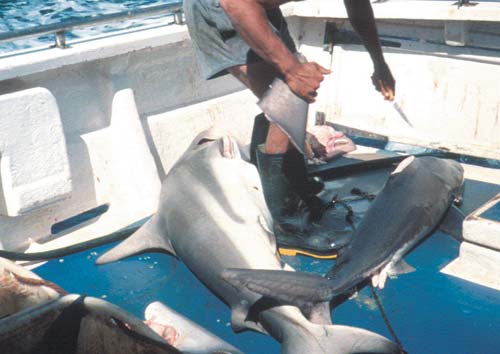Shark fisheries management: TRAFFIC develops new risk assessment method
Cambridge, UK, 23rd April 2014—TRAFFIC has developed M-risk, a novel method to quantify the risk posed by over-exploitation of shark stocks as part of a project supported by the UK’s Department for Environment, Food and Rural Affairs (Defra).

The technique assesses the risk that adequate management measures are not in place to protect shark species adequately (M-Risk) and is detailed in Development of a Rapid Management-Risk Assessment Method for Fish Species through its Application to Sharks: Framework and Results, published earlier this month.
The study builds on earlier work by TRAFFIC examining the intrinsic vulnerability of different shark species to over-exploitation.
46 medium or high risk species were chosen for the latest study, whose goal was to develop a blueprint for a transparent, repeatable risk assessment framework suitable for application to a variety of marine species, not only sharks.
The resulting M-Risk assessment identifies the species / stocks of sharks of potential concern and their relative level of concern. This allows for prioritization of those species / stocks where management measures are critical and also identifies those stocks where improvements to management measures are needed.
Out of 173 shark stocks identified for the 46 species concerned, 150 (87%) were assessed as having a high M-Risk and 23 as having a medium M-Risk. The large number of high M-risk assessments is a reflection of the inadequacy of shark catch and bycatch data as well as a lack of shark stock management measures.
“TRAFFIC’s studies of the international shark trade should enable fisheries management authorities to determine which species are at high risk of over-exploitation and what management measures need to be taken to lower that risk,” said Glenn Sant, TRAFFIC’s Marine Programme Leader.
“In some instances, protection measures under multilateral environmental agreements might be warranted, or the need for such steps could be averted if prompt action is taken to address identified problems.”
The M-risk assessments are consistent with existing listings of a number of shark species under the Convention on International Trade in Endangered Species of Wild Fauna and Flora (CITES) and the Convention on the Conservation of Migratory Species (CMS).
“The international community has recognized that over exploitation of many shark species is occurring,” said Sant.
“Responsible Management, Trade and Consumption are important elements of shark conservation and the development of M-risk assessments moves us another step closer to curtailing the over-exploitation of sharks, provided the insights of such analysis are acted upon by fisheries managers.”



